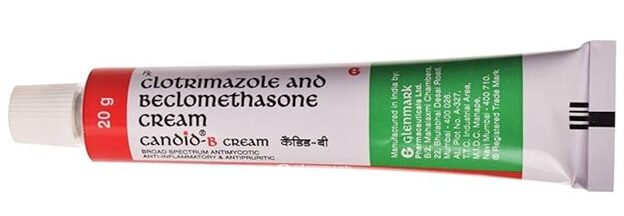Last updated on July 14th, 2025 at 11:42 am

Which Cream Is Best For Fungal Infection In Private Area?
Fungal infections in private areas can be uncomfortable, embarrassing, and even painful. However, they’re also quite common and treatable. With a plethora of creams available in the market, it’s crucial to make an informed decision about which one is best suited for your needs.
Fungal infections in private areas, commonly referred to as jock itch (tinea cruris) in men and yeast infection or vaginal thrush in women, are caused by the overgrowth of fungi in warm and moist areas of the body. These infections often lead to symptoms such as itching, redness, burning sensation, and sometimes even discharge. The most common fungi responsible for these infections are Candida albicans and dermatophytes.
Causes of Fungal Infections in Private Areas
1. Candida Overgrowth
Candida, a type of yeast, is the most common cause of fungal infections in private areas. Candida naturally resides in the body, particularly in warm and moist areas like the genitals. However, factors such as weakened immune system, poor hygiene, or the use of antibiotics can disrupt the natural balance of microorganisms, leading to candida overgrowth and infection.
2. Poor Hygiene
Insufficient personal hygiene practices, such as not washing the genital area regularly or wearing tight-fitting, non-breathable underwear, can create an environment conducive to fungal growth. Sweat and moisture trapped in clothing can further exacerbate the problem, providing an ideal breeding ground for fungi.
3. Weakened Immune System
Individuals with compromised immune systems are more susceptible to fungal infections in private areas. Health conditions such as HIV/AIDS, diabetes, or receiving immunosuppressive therapy can compromise the body’s ability to fend off fungal overgrowth, heightening susceptibility to infections.
4. Sexual Activity
Engaging in sexual activity, particularly unprotected intercourse, can introduce fungi and bacteria into the genital area, leading to infections. Practices such as sharing sex toys or having multiple sexual partners can also contribute to the spread of fungal infections.
5. Antibiotic Use
Antibiotics can disrupt the balance of microorganisms in the body by killing both harmful and beneficial bacteria. This disruption can promote the overgrowth of fungi like Candida, increasing the likelihood of developing a fungal infection in private areas.
6. High Blood Sugar Levels
Individuals with uncontrolled diabetes often have elevated blood sugar levels, which can create an environment conducive to fungal growth. Excess glucose in bodily fluids, such as urine, can provide nourishment for fungi, leading to recurrent infections in the genital area.
7. Warm and Humid Environment
The genital area, particularly in India’s tropical climate, can become warm and humid, creating favorable conditions for fungal growth. Prolonged exposure to moisture, such as wearing wet clothing or staying in sweaty conditions, can increase the risk of developing a fungal infection.
8. Tight Clothing
Wearing tight-fitting clothing, especially synthetic materials that do not allow proper ventilation, can trap heat and moisture around the genital area. This creates an ideal environment for fungi to thrive and multiply, leading to infections.
Fungal infections in private areas can be uncomfortable and disruptive to daily life, but understanding their underlying causes is essential for effective prevention and treatment. By maintaining good personal hygiene, wearing breathable clothing, and addressing underlying health conditions, individuals can reduce their risk of developing fungal infections in the genital area. Additionally, seeking prompt medical attention and using appropriate antifungal treatments can help alleviate symptoms and prevent recurrence.
Key Considerations When Choosing a Cream
1. Antifungal Ingredients
Look for creams containing antifungal agents such as clotrimazole, miconazole, ketoconazole, or terbinafine. These ingredients effectively combat fungal overgrowth and relieve symptoms.
2. Safety
Ensure that the cream is safe for use in sensitive areas like the groin or genital region. Avoid creams containing harsh chemicals or irritants that may exacerbate the condition.
3. Effectiveness
Choose a cream with a proven track record of effectively treating fungal infections. Reading reviews or consulting healthcare professionals can help you gauge the cream’s efficacy.
4. Formulation
Creams come in various formulations, including creams, ointments, and powders. Consider your preference and the severity of your condition when selecting the formulation.
5. Price
While cost shouldn’t be the sole determining factor, consider the cream’s affordability, especially if you anticipate needing it for an extended period.
Which Cream Is Best For Fungal Infection In Private Area?
1. Candid B Cream
Candid B contains beclomethasone and clotrimazole, making it effective against fungal infections and associated inflammation. It’s widely available in pharmacies across India and is known for its efficacy.
Buy Candid B Cream – Buy (15% Discount)

2. Terbinaforce Plus Cream
Terbinaforce Plus combines terbinafine and clobetasol, providing potent antifungal and anti-inflammatory properties. It’s particularly effective against stubborn fungal infections.
Buy Terbinaforce Plus Cream – Buy (15% Discount)
3. Zole F Cream
Zole F Cream contains fluconazole and clobetasol, offering dual action against fungi and associated inflammation. It’s recommended for severe or recurrent fungal infections.
Buy Zole F Cream – Buy (15% Discount)
4. Ring Guard Cream
Ring Guard is a popular over-the-counter cream containing clotrimazole and chlorhexidine. It effectively treats fungal infections while preventing secondary bacterial infections.
Buy Ring Guard Cream – Buy (15% Discount)

5. Itch Guard Cream
Itch Guard contains miconazole and menthol, providing relief from itching and discomfort associated with fungal infections. It’s suitable for mild to moderate cases.
Buy Itch Guard Cream – Buy Online
Besides creams, oral medications such as Vizylac Capsule can be effective in preventing infections in the private area. Antibiotics like Nole Tablet (a combination of Ofloxacin and Ornidazole) can also be effective in preventing or treating mixed infections in the private area, especially when bacterial involvement is suspected.
Usage Tips for Fungal Infection Creams
- Follow the instructions provided on the cream’s packaging or as directed by your healthcare provider.
- Clean and dry the affected area before applying the cream to ensure optimal absorption.
- Use the cream consistently for the prescribed duration, even if symptoms improve before completion.
- Avoid tight-fitting clothing and maintain good hygiene to prevent recurrence of fungal infections.
Conclusion
Dealing with fungal infections in private areas can be challenging, but choosing the right cream can make a significant difference in your comfort and recovery. By considering factors such as antifungal ingredients, safety, effectiveness, formulation, and price, you can select a cream that suits your needs. Remember to consult a healthcare professional if you have any doubts or concerns about your condition. With the right cream and proper care, you can effectively treat fungal infections and restore comfort to your private areas.
FAQs on Which Cream Is Best For Fungal Infection In Private Area?
1. What are some common antifungal creams available for treating fungal infections in the private area?
Some commonly used antifungal creams for treating fungal infections in the private area include Clotrimazole, Miconazole, and Terbinafine. These creams are readily available over-the-counter at pharmacies and are effective in treating various types of fungal infections.
2. Which factors should I consider when choosing the best cream for a fungal infection in my private area?
When selecting a cream for treating fungal infections in the private area, it’s essential to consider factors such as the specific type of infection, any underlying health conditions, and personal preferences. Consulting a healthcare professional for a proper diagnosis and recommendation can help determine the most suitable cream for your needs.
3. How should I use antifungal creams to treat a fungal infection in my private area effectively?
To effectively treat a fungal infection in the private area with antifungal creams, it’s important to clean and dry the affected area thoroughly before applying the cream. Follow the instructions provided by the manufacturer or healthcare provider regarding the frequency and duration of application. It’s also advisable to continue using the cream for the full course of treatment, even if symptoms improve, to prevent recurrence.
4. Are there any natural or home remedies that can help alleviate fungal infections in the private area?
While antifungal creams are the primary treatment for fungal infections in the genital area, some individuals may find relief from symptoms by practicing good hygiene, wearing breathable clothing, and keeping the affected area clean and dry. Additionally, certain natural remedies like tea tree oil or yogurt with probiotics may have antifungal properties, but their effectiveness can vary, and it’s essential to use them with caution. Consulting a healthcare professional is recommended for proper diagnosis and treatment of fungal infections.
Related Links :
- Neem Soap: Benefits and Uses for Skincare
- Cetaphil Oily Skin Cleanser right for you
- Best Face Cream With Vitamin C And Suitable For All Skin Types
- Best Skin Whitening Treatment at Home
- Skin Allergy: Cream, Ointment, Skin Allergy Medicine
- Common Skin Infections
- Caring for Sensitive Skin
- Homemade Face Masks for Every Skin Type